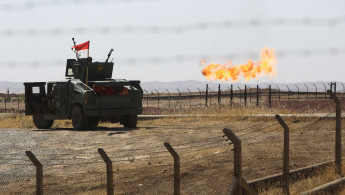Iraqi forces assume control after Kurds withdraw from disputed areas
Kurdish forces withdrew from disputed areas across northern and eastern Iraq on Tuesday in a dramatic redeployment of fighters which opened the way for Iraqi troops to take over strategically important and oil-rich territories.
Iraqi military units on Monday launched an offensive against Kurdish positions in Kirkuk, taking control of vital oilfields and other key infrastructure such as a military airport, police stations and gas facilities.
Kurdish forces, who were vastly outnumbered, appeared to bow to demands from Baghdad that they hand over areas outside of the Kurdish autonomous region, including land seized from the Islamic State in 2014.
The evacuations, however, have exposed a Kurdish leadership in turmoil in the wake of last month's independence referendum which had incensed Baghdad.
Iraqi Prime Minister Haidar al-Abadi acknowledged the power shift, saying Iraqi forces took over the disputed areas with barely a shot fired.
 |
|
"I call on our citizens to celebrate this day, because we have been united," al-Abadi said, calling the independence vote "a thing of the past" as he offered to begin talks with the Kurdish regional government.
A hospital in Suleimaniyah said it had received the bodies of 25 Peshmerga fighters killed in clashes over Kirkuk, although the claim could not be independently verified.
Thousands of residents had fled Kurdish distracts to escape the clashes, heading in buses and cars towards the Kurdistan region.
While the mood in Baghdad was triumphant there was much acrimony in the Kurdish capital of Erbil, where many felt betrayed by their own leaders.
"Kirkuk was sold out, everyone ran away," said Amir Aydn, a 28-year-old Kirkuk resident as he returned to the city after fleeing the day before.
Kurdish divisions
Kurdish President Masoud Barzani said the evacuation of Kirkuk was forced by "certain people in a certain party," a swipe at his political opponents in the Patriotic Union of Kuridstan (PUK).
The General Command of the Peshmerga, nominally in Barzani's hands, went even further, accusing PUK officials of "a great and historic treason against Kurdistan."
Barzani heads the Kurdistan Democratic Party (KDP).
Accusations of betrayal are grounded in reports that Peshmerga divisions loyal to the PUK abandoned their positions as Iraqi forces advanced, although KDP-aligned divisions also withdrew.
Peshmerga commander Wista Rasoul, who led a PUK-aligned division in Kirkuk, denied fractures in the Kurdish military ranks and said the pull-out was a response to the central government's vastly superior firepower.
The leadership of the KDP also condemned the PUK for meeting with Qassem Soleimani, a commander of Iran's Revolutionary Guards who advises Iraq's predominantly Shia Popular Mobilisation Forces, in the run-up to this week's territorial withdrawal.
Ala Talabani, a leading PUK official, defended her meeting with Soleimani on Saturday when he came to pay his respects over the death of her uncle, the late Iraqi President Jalal Talabani.
She said Soleimani's counsel was wise and praised Iran's role in Iraq.
"Soleimani advised us ... that Kirkuk should return to the law and the constitution, so let us come to an understanding," she told the Arabic language TV station al-Hadath.
Barzani has insisted he would not give up his campaign for independence, though such hopes seem more distant than ever in the dismal fallout from the referendum.
Kirkuk was a vital source of oil revenues for the Kurdish regional government.
Vahal Ali, a senior adviser to Barzani, told The Associated Press the Peshmerga would have to withdraw to the areas it held in 2014, before it deployed across northern Iraq in the fight against the Islamic State group.
Analysts say the opportunism that characterised Kurdish politics before the independence vote has resurfaced.





 Follow the Middle East's top stories in English at The New Arab on Google News
Follow the Middle East's top stories in English at The New Arab on Google News


